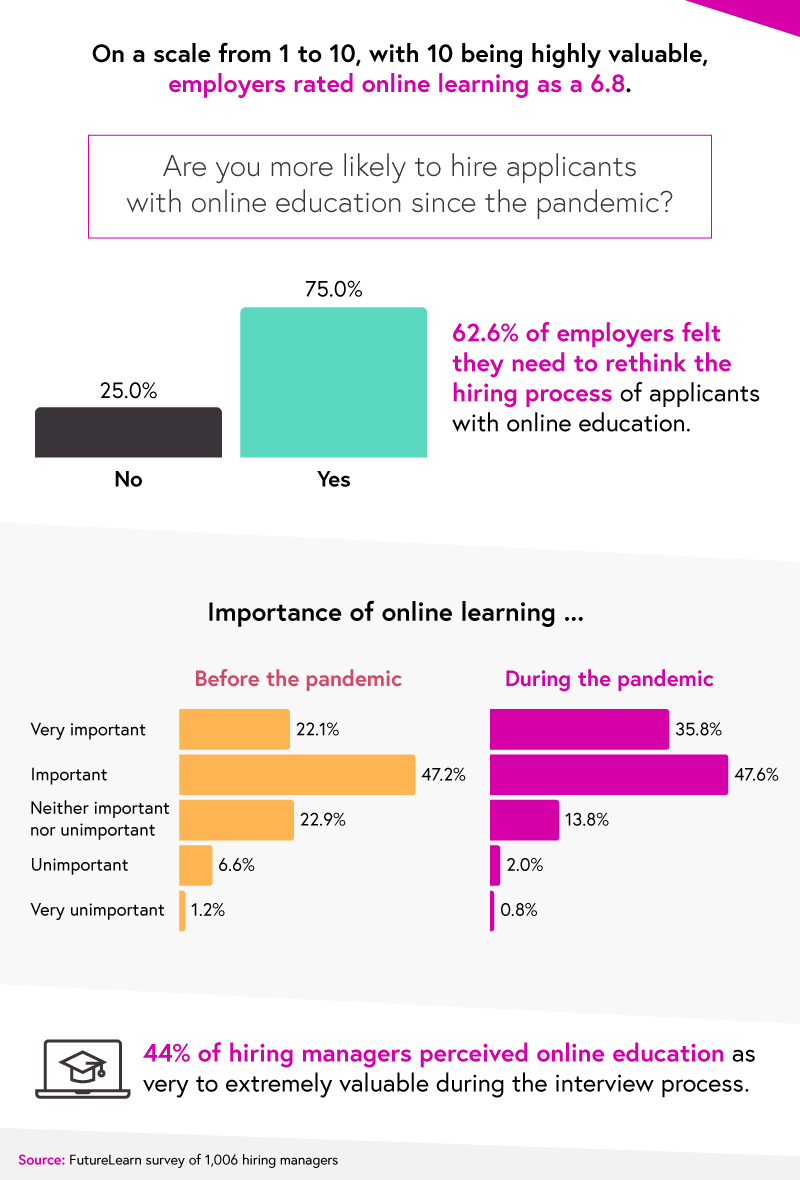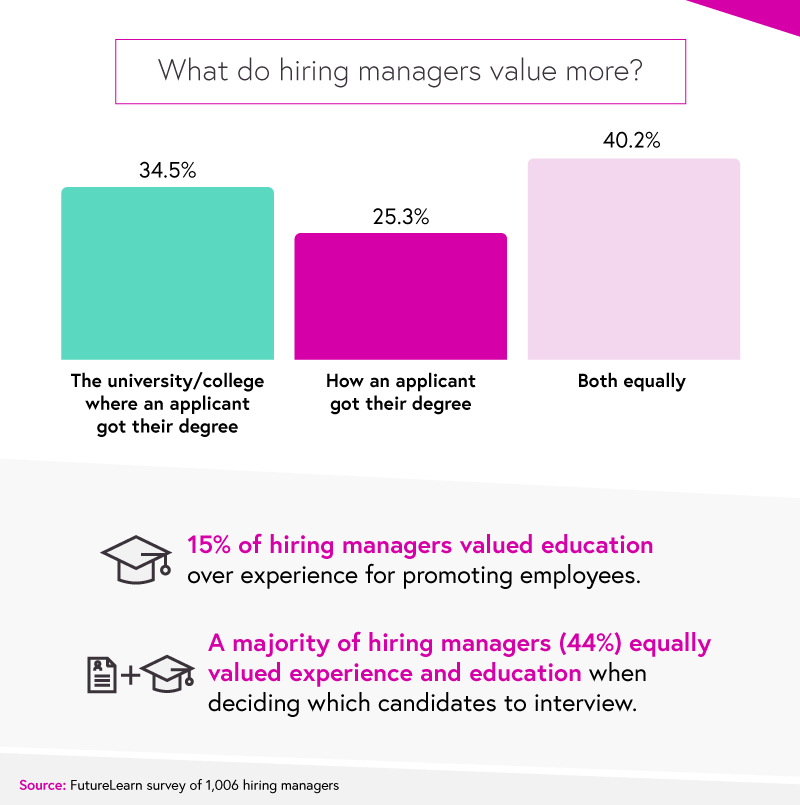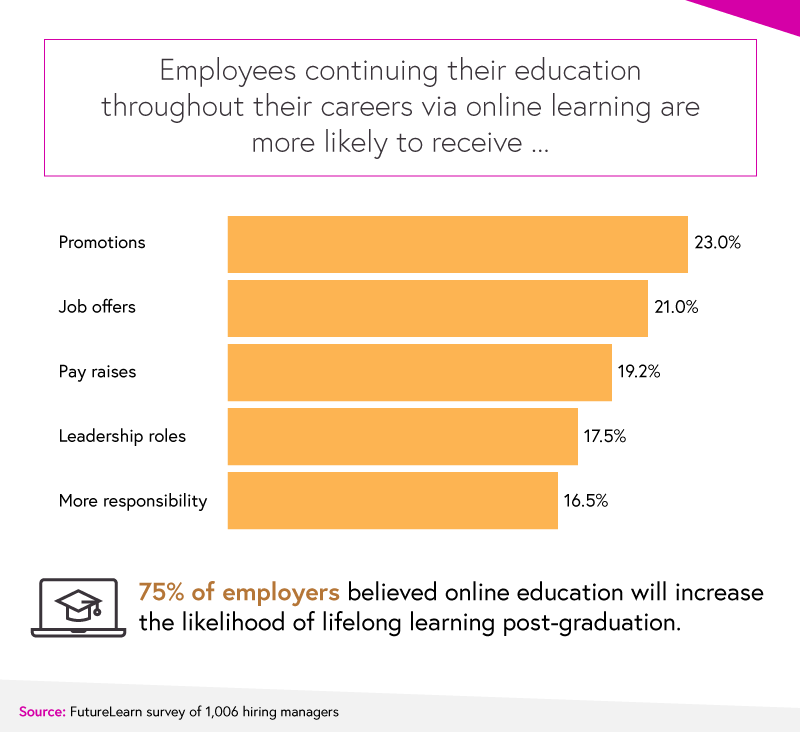Do employers value online learning?
Education was one of the many industries that had to adapt to COVID and offer distance or remote learning. Many traditional universities are exploring a variety of options for remote learning in the time of COVID-19 with some classes even transitioning to fully online. Meanwhile, entirely online degrees grow in both popularity and prominence.
Given the importance and growth of online education, many learners ask: Do (and should) employers perceive any difference in value between online and traditional education? Does an applicant with an online degree now stack up equally with a student who is learning online through a traditional university? And how does this vary by industry?
To find out, we conducted a survey of both hiring managers and employees that got their degrees completely online to gauge their opinions. Do hiring managers see these applicants as more or less qualified? And are online-educated applicants having an easy time in the job market?
Hiring Manager Impressions of Online Education
Our study began by asking hiring managers about their perceptions of online education. They first shared their overall impressions and compared their opinions before and after the pandemic.

While some hiring managers were only slightly positive about online education (they rated it a 6.8 out of 10 on the value scale), most wanted to rethink this mindset – especially now. Three-quarters of hiring managers were more likely to hire applicants with solely online education today than they were prior to 2020. The pandemic may have worked to change attitudes towards the perceived value of online learning.
Not only do hiring managers rate online education as more acceptable since COVID-19 but also as more important. This group was nearly 14 percentage points more likely to rate online education as “very important” during the pandemic than they were prior to the health crisis. Perhaps with even traditional students going online, the playing field has been leveled as far as impressions are concerned.
Another 44% perceived online education as being extremely valuable to the interview process itself. Catalina Schveninger, Chief People Officer at FutureLearn and lead educator on the FutureLearn ‘Online Recruitment and Onboarding’ course, said, “We have witnessed some of the biggest disruptions to recruitment and onboarding processes throughout 2020, with remote hiring fast becoming the norm across almost all industries. That’s why it’s more important than ever for companies and candidates alike to be able to adapt to these new digitised practices and demonstrate their resilience and flexibility.”

Even beyond the pandemic and its many restrictions, however, most employers (89%) still envision online learning becoming more and more common. After all, 75% of this group reported that they already rely on online training tools and courses to perform their own jobs.
The Appeal of Online Education to Hiring Managers
Next we dug into the perceived benefits of online learning among hiring managers. They shared the most commonly valued traits they noticed among employees who had invested in their career through online learning.

Hiring managers readily noticed an ability to work independently among online learners. This type of self-motivation is one of the most important skills an employee can have today, where so much of work (as well as education) has gone remote. Remote students and employees alike need to be able to be proactive without the constant reminders of a traditional office or classroom setting.
18% of managers also appreciated the online learner’s ability to use tech and online platforms to get the job done. Note that tech is also a primary skill desired by today’s remote hiring forces. Remote hiring managers are currently seeking “people who are familiar with remote communication and collaboration tools because they’ll be able to come up to speed quickly in a new job,” according to Brie Weiler Reynolds of Remote.co.
And when it came to earning potential? Online learners are officially thought to have more. This may be a reason why we’re seeing top-tier schools offering entirely online programs as well.
Comparing Online Education to Traditional Experience
Next, we wanted to know if it was more important to hiring managers how an applicant got their degree or where. We also asked which mattered more in terms of interviews and promotions.

The name of the university an employee went to (whether online or in person) is still more important than how the person actually got into the school and obtained their degree. In other words, whether you went to the University of Michigan online or in person matters more than whatever incredible story got you into either program.
Experience still mattered most. Most hiring managers did not value education over on-the-job-experience, though they were more likely to increasingly value education if it was just for an interview as opposed to an actual promotion.

Hiring managers were willing to downplay experience when hiring for an entry-level position. 47% said the education mattered more to them than experience if the potential employee was just starting out. But once it came to promoting somebody already in the company, experience mattered more.
Online Education on the Job
Another beauty of online education is that it doesn’t necessarily have to stop. Employees may pursue online learning in addition to their careers, if they choose. Online courses can offer the flexibility to work around schedules and timelines, while the resources obtained can prove invaluable to careers. The next part of our study asked hiring managers what types of things employees in continued online education were more likely to receive at work.

As it turns out, employees who continued educating themselves online were more likely to receive all the good things: promotions (23.0%), pay raises (19.8%), and leadership roles (17.5%). Companies clearly value this practice in their employees.
Many companies today even offer financial incentives for employees to learn online. Applying what you learn online to today’s remote workplace has also never been easier. According to our hiring managers, online education while on the job will prime you for some pretty lucrative and prestigious rewards.
Showcasing an Online Education
A substantial portion of our respondents were already online degree-holders themselves. We next asked this subset how they listed their degree on their CVs, as well as how their application experiences typically went.

Online degree holders overwhelmingly opted to showcase the degree on their resumes. Just 3% did not. And with good reason: Nearly 40% of those with online degrees had more positive experiences when applying specifically because their degree was online. If you hold an online degree – or any certificate or training received online – results indicate you should definitely put it on your resume.
The Future of Learning
If you have spent time learning online, it’s certainly time to showcase it, now more than ever. Hiring managers demonstrated increasing interests in these types of employees and even increased the likelihood of rewarding them with raises and promotions on the job.
If you’re new to the world of online education, take a look at the courses on offer at FutureLearn. You can build new skills online with top educators and experts, receive credit towards a degree, or even complete a full degree online.
Methodology and Limitations
This study uses data from a survey of 1,006 U.S. hiring managers and 132 people with degrees from online universities. The survey polled 1,006 U.S. hiring managers to provide a holistic view of online education’s value in the hiring and promotion process. The average age of respondents was 38 years, with a standard deviation of 11 years. 54.7% of respondents identified as male, while 45.3% identified as female.
The main limitation of this survey is the reliance on self-report, which is faced with several issues including, but not limited to, attribution, exaggeration, telescoping, and recency bias.
Fair Use Statement
Online education starts here – with the sharing of information. If you know someone who could benefit from the findings of this study, you are welcome to share it with them or your audience. Just be sure your purposes are noncommercial and that you link back to this page.



